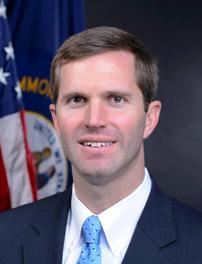Beshear Sets Record: Kentucky Gubernatorial Primary By the Numbers
The Democrat received the largest support in a contested gubernatorial primary in state history
 While there was not much drama at the top of the ticket in Kentucky’s primary on Tuesday, multiple state records were set at the ballot box.
While there was not much drama at the top of the ticket in Kentucky’s primary on Tuesday, multiple state records were set at the ballot box.
On the Democratic side, there was no doubt Governor Andy Beshear would cruise to renomination – and he did so in record fashion.
The popular red state governor received 91.9 percent of the primary vote – the best ever showing in a contested gubernatorial primary in Kentucky history.
Beshear was opposed by two candidates – perennial candidate Geoff Young won 4.9 percent and former 1999 GOP gubernatorial nominee Peppy Martin garnered only 3.2 percent.
The state’s previous high water mark was held by Republican Edwin Morrow who won 88.6 percent in 1915’s two-candidate race. Morrow, who would later win the governorship in 1919, was an attorney and former U.S. District Attorney for the Eastern District of Kentucky.
The previous best showing in a primary by a Democrat was Jack Conway’s 78.8 percent in 2015 in a two-candidate field against the aforementioned Geoff Young.
Just five major party nominees for governor in Kentucky won their nominations without opposition – incumbent Democrats J.C.W. Beckham in 1903, Paul Patton in 1999, and Steve Beshear in 2011 and Republicans Edwin Morrow in 1919 and Simeon Willis in 1943.
On the Republican side of the ballot, a state record 12 candidates sought the party’s nomination with Attorney General Daniel Cameron cruising to a 25-point victory over two-term state Agriculture Commissioner Ryan Quarles.
The 2023 GOP field was twice as large as the previous party record of six set in 1983 when State Senator and ex-baseball star Jim Bunning was nominated.
Democrats once fielded 10 candidates for the office back in 1967 when former state legislator Henry Ward defeated former Governor Happy Chandler and eight other hopefuls.
Given that a dozen candidates were on the Republican ballot yesterday, it should not be surprising that Cameron failed to win a majority of the vote – receiving 46.9 percent.
But that still goes in the books as the third lowest support in a primary registered by a Kentucky GOP gubernatorial nominee out of 26 contests, ahead of only the 32.9 percent won by Matt Bevin in 2015 and 41.4 percent recorded by State Representative John Harper in 1987.
Bevin would win the governorship against Jack Conway while Harper lost the subsequent general election to Wallace Wilkinson by nearly 30 points.
Follow Smart Politics on Twitter.

DE senator Tom Carper is out which means that aside from the 2010 special election to replace Biden, this is the 1st open seat since 1970. the big question new is will congresswoman Lisa Blunt Rochester run to replace him?
If Representative Blunt Rochester were to succeed Carper in 2025 (or late 2024 via appointment after having been elected) she would become the 6th incumbent at-large US House member to have succeeded a senator of the same party since “Bill” Roth succeeded J J “Whispering Willie” Williams in 1970 (the others during the time frame are M Andrews of ND in 1980, J Jeffords of VT in 1988, C Thomas of WY in 1994, and P Welch of VT in 2022).
The apparent encouragement from the retiree that Rochester should run should all but make her candidacy for and nomination and election to the seat much more likely than not.
Governor Beshear assuredly hopes that Senator (leader of the US senate caucus leader of his party) “Mockba Mitch” does not die or resign – at least before he is re-elected later this year. At any rate, the personally popular chief executive seems bent on either appointing a Democrat to fill a vacancy, or just leave the seat vacant until the next election, in either 11 of 2024 or at an earlier time (i.e. accelerated schedule).
《Any state election law that restricts its governor of her/his US Senate appointment powers based on partisan affiliation may very well violate the Federal constitution, since a US Senate seat is a federal position and there is no provision for such constraint upon the governor within the document.》